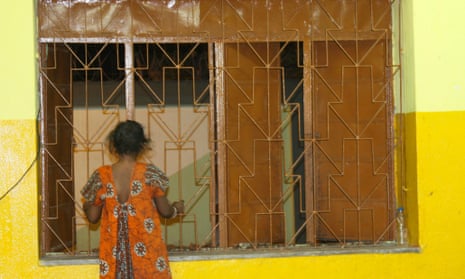I have never met Rina, but an account of her struggle (pdf) to come to terms with her mental illness is moving.
“My name is Rina … I have been to hell and back, and I am proud to be able to stand here tall and say that I survived and I am continuing to survive my illness and society’s stereotypes of me. I am also a woman, mother, wife and an individual with schizophrenia.”
Rina has the right combination of medication and a support structure to address her illness. But there are thousands of women in India who are not as fortunate, as a recent Human Rights Watch (HRW) report, Treated worse than animals, revealed.
The HRW team visited 24 mental health hospitals and state-funded residential care facilities and interviewed 200 women and girls with psychosocial or mental health disabilities, their families and caretakers, as well as mental health professionals, service providers, government officials and police in six cities.
The 104-page study is a difficult read. It exposes involuntary admissions and arbitrary detentions of women in these facilities; overcrowding and a lack of hygiene; inadequate access to healthcare; forced treatment, including electroconvulsive therapy, as well as physical, verbal and sexual violence.
Take for example, the Yerawada mental hospital in Pune, Maharashtra. It is the biggest government-run hospital in Asia and houses 1,864 patients but has only 25 functional toilets. “Open defecation is the norm,” Dr Vilas Bhailume, the hospital’s superintendent, told the researchers.
“The condition of mental hospitals is the same all over the country. This is because the ethos of these hospitals is wrong … they are run not as mental hospitals but as prisons,” says Ratnaboli Ray, the director of Anjali, a Kolkata-based mental health rights organisation that interviewed Rina.
She says these institutions suffer because of the bad quality of staff and their attitude. “Even the trained staff lack empathy. Their attitude is ‘we know best’,” Ray explains. “Unfortunately, the training programmes reinforce this attitude.”
Kirti Sharma, researcher in the disability rights division of HRW, agrees. “It was not difficult to go into these institutions to investigate because their staff did not think that there was anything wrong in the way they are tackling the inmates.”
HRW researchers were told that staff do not receive training on how to deal with patients.
Access to mental healthcare is limited in India. There are only 43 government mental health hospitals to provide services for the estimated more than 70 million people living with psychosocial disabilities. For every 1 million people, there are three psychiatrists, with psychologists even more scarce. Only 25% of hospitals, clinics and mental health professionals are in rural areas, where 70% of the population live.
Both Ray and Sharma say that, for the situation to improve, the government must move from an institution-based approach to a community-based one, to address the needs of people with mental illness. They say India needs smaller, local clinics that people can access when symptoms first arise.
In 1982, the government launched a national mental health programme to improve services by upgrading facilities and staff training, and providing care at the community level. But it has not been implemented well. “I visited five centres in Delhi,” says Sharma. “Each is supposed to be staffed by one psychiatrist, one psychologist and a social worker. I found the same psychiatrist in all five centres, and in some there were no psychologists or social workers. There are not enough people working in the field, partly because the stigma of these disabilities extends to the professionals who assist them.”
In October, India unveiled its first mental health policy, which aims to reduce the treatment gap by providing universal access to mental healthcare through increased funding and human resources.
“The policy is progressive but it does not move away from large institutions totally,” says Sharma, adding that legal reform is needed to ensure that “like everybody else, people with disabilities have legal capacity – the right to make their own decisions – and receive the necessary support to do so”.
Along with all these, there is one important factor that needs to change. Society must stop treating people with mental illness as outcasts. This, Sharma says, is a mammoth challenge.

Comments (…)
Sign in or create your Guardian account to join the discussion